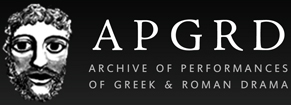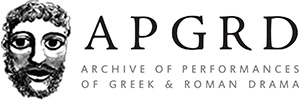Oxford and RHUL students, Helen Slaney, Lottie Parkyn, Henry Stead, Jarrid Looney, Matt Shipton worked together to create SHEFFEST: Sheffield Festival of Ancient Drama (22-25 June 2012). The project aimed to take Greek theatre back to its original form, as an inclusive community event for the whole city, and performed against the cityscape. For more information, visit their website: SHEFFEST: Sheffield Festival of Ancient Drama.
PhD students, Alex Wardop (Bristol) and Jen Grove (Exeter) created a project called 'Penelope (th)Reads: creative reading workshop and exhibition': Our project creates the space for a community reading and sewing group in which we re-read some texts from ancient Greece and Rome. The one-day workshop, which will be led an artist and activist trained at the Royal School of Needlework, will draw on art therapy techniques and the practices of feminist consciousness raising, to un-pick and re-sew ancient texts. Through group discussion, sharing of stories, free-sewing and more focused making, we’ll tease out, un-pick, and re-sew interpretations of the texts we read. We are holding an exhibition at a local volunteer-run art space (Arts West Side Gallery) that will run for a week (18-25th of July). A crucial part of this project is the opening-night fundraiser for the non-profit organisation Daughters of Eve, which works to protect girls and young women who are at risk from female genital mutilation and Bristol Rape Crisis, Bristol’s dedicated centre and helpline for supporting women affected by rape and sexual violence. The aim of the project is to raise funds and awareness for these two vital services but also to challenge received ways of reading and talking about ancient texts. It is also about having fun and creating pieces of art to be displayed in the local area. Calling the project Penelope (th)Reads acknowledges the ancient relationship between text and textile, where words become material things that can be un-picked, re-sewn, rag-rugged, re-woven. More than this, however, the title of the workshop acknowledges the strong association between women and weaving that emerges in the Classical tradition. We’re following a long tradition where women are weavers, websters, and spinsters; re-making texts in textiles to break silences, share stories and make new connections. Penelope, the wife of Odysseus in Homer’s Odyssey doesn’t say very much, but she does sew, un-pick, and re-sew her web, in a cunning act of narrative delay, detouring and play. Our little project opens up words that are all to often seen as fixed and detached from the lives of people in the community. By creating a space where the canonical words of antiquity are interwoven with the words and webs of our own stories, Classical literature becomes contemporary activism!"
Lucy Jackson is a doctoral student at Corpus Christi College, Oxford, writing a thesis on the nature and social function of the Greek chorus in the fourth century BC. She has a continuing interest in all kinds of drama that she indulges both on and off-stage. Lucy has used the training from the 'Communicating Ancient Greece and Rome' programme in a number of ways, and hopes to combine a number of elements in a forthcoming publication in collaboration with the National Theatre Archives focused on modern uses of the chorus in the National Theatre's recent history.
Adam Lecznar has collaborated with both the National Theatre and with the UCL Greek and Latin department on projects, both completed and on-going, involving the modern performance of ancient Greek tragedy. With the National Theatre he has given one free to attend public talk on the subject of his thesis, a performance of Euripides' Bacchae at that same theatre in 1973, which was very well attended and received. He is also involved in the creation of other material which will raise awareness of the National Theatre's history of producing versions of ancient Greek tragedies and explain the modern ramifications of those versions. These projects have been facilitated by the CAGR events at the National Theatre. With UCL he has been a part of a team surrounding their annual Classics Play which has tried to provide explanatory material to introduce the play to a young audience of school children. He has found the CAGR course extremely useful and will continue to make use of the knowledge and contacts he has gained during the process.
Amanda Potter is a part time PhD student with the Open University. Amanda's project was a public lecture entitled Wild Women: Dionysus, Violence and the Female in the Bacchae and Beyond, given at Northampton Underground Theatre on 9 June, to tie in with the Northampton Festival of Chaos featuring productions of the Bacchae and Lorca’s Blood Wedding: "Northampton theatres do not usually offer talks from academics, and so when I saw that they were putting on the Bacchae I contacted the theatre. The Artistic Director, Laurie Sansom, was very happy for me to come along, and offer a wide-ranging talk including the origins of Dionysus, women in 5th century Athens, Pandora, the Amazons, the Furies, Maenads and women and violence in the media. Pandora, the Amazons and the Furies on television are the subject of my research, and so although I linked the myths with the Bacchae and Blood Wedding for the purpose of my talk, this was also a way to share my research at a very high level with members of the general public. Over 50 people attended this free lecture, most of who had also booked to see the Bacchae and Blood Wedding. From feedback forms completed I found that most people attended because they wanted to learn more about women in Greek mythology and obtain more background to the Bacchae. All attendees that filled in the feedback form enjoyed the lecture, and they particularly enjoyed the overview of women in Greek myth and the parallels with modern views on women and violence. Many of the attendees came to talk to me after the lecture, and I have been asked to reprise the talk for a group of college students later in the year."

